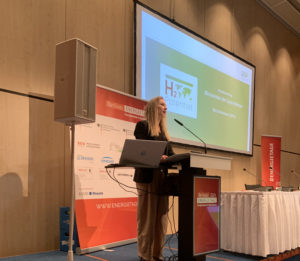On 15 May, at the Berlin Energy Days 2024, the HYPAT consortium presented the results of its joint project, which is currently in its final phase after three years. IDOS researcher, Dr Rita Strohmaier, presented results of the in-depth studies on potential hydrogen export countries.

These in-depth studies were carried out as part of HYPAT project. The potential hydrogen export countries see opportunities in the emerging hydrogen economy for the decarbonisation of their own industry and transport as well as, in principle, for exports, e.g. to Germany. For them, the question of the extent to which value creation and job effects can be achieved takes centre stage. They are also confronted with considerable uncertainties that they cannot control, which means that national hydrogen strategies are being implemented only hesitantly.
Prof. Christopher Hebling from the Fraunhofer Institute for Solar Energy Systems presented the perspective of Germany, which will have a high import requirement for low-emission hydrogen and derivatives such as ammonia or methanol in the medium term. According to him, many developing countries have great potential in terms of renewable energies for the production of green hydrogen. Complex investment uncertainties and the resulting high capital costs are currently still hampering the market ramp-up.
Important policy recommendations were also summarised by Prof. Andreas Löschel from the University of Bochum. According to him, these recommendations could at least partially remove the blockages in the hydrogen ramp-up. He emphasised the importance of Germany cooperating with other countries in the EU and beyond, for example in order to achieve uniform hydrogen standards and set up joint funding instruments for the hydrogen ramp-up. Joint measures should also be implemented to support potential export countries, for example through scientific and technical cooperation and the strengthening of vocational training in developing countries.
The presentations were followed by panel sessions with high-ranking representatives from politics, science and international organisations. At the invitation of IDOS, Tomás Villalba from the Argentinian embassy was one of the speakers on the panel on the prospects for exporting countries.
The HYPAT consortium is currently working on a possible follow-up project to deepen the knowledge gained on the complex ramp-up of a global hydrogen economy and interlink it with new issues.

Schreibe einen Kommentar